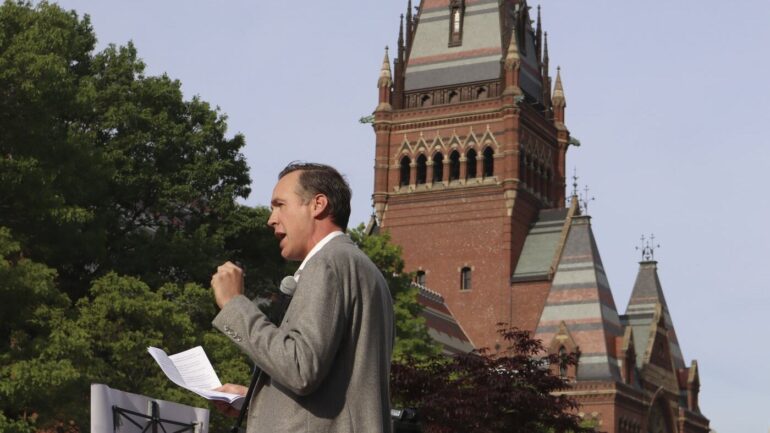In a bold move, the Trump administration has been extracting massive financial settlements from some of America’s most prestigious institutions, with Harvard University potentially facing a staggering $500 million payout to resolve ongoing disputes. This follows a pattern of hefty fines and negotiations targeting universities, law firms, and media giants, as reported by The New York Times and Axios. The administration’s aggressive approach has sparked debates over accountability, power, and the future of higher education.
Harvard’s High-Stakes Negotiation
Harvard, one of the nation’s top Ivy League schools, is in talks to pay up to $500 million to settle a dispute with the Trump administration. The conflict centers on accusations of antisemitism on campus and the university’s diversity, equity, and inclusion (DEI) programs, which President Trump has criticized as fostering division. The potential settlement is more than double the $221 million Columbia University recently agreed to pay to resolve similar issues. Unlike Columbia, however, Harvard is hesitant to send funds directly to the federal government, preferring to negotiate terms that preserve its autonomy.
The Trump administration has taken a hard line against Harvard, accusing it of failing to protect Jewish students from harassment amid protests over the Israel-Hamas conflict. In response, the White House canceled hundreds of research grants, threatened Harvard’s accreditation, and even moved to bar international students from attending the university. These actions have pushed Harvard to consider a settlement to avoid further financial and operational setbacks during Trump’s term.
A Template for Accountability?
The Trump administration has pointed to its deal with Columbia as a model for other universities. Columbia’s $221 million settlement resolved federal investigations into alleged violations of antidiscrimination laws, restoring over $400 million in research grants. The agreement allowed Columbia to avoid admitting wrongdoing, a common tactic in such settlements, according to Donna E. Shalala, a former university leader. “You preserve your right to continue as an institution,” she told The New York Times.
However, Harvard’s situation is more complex. The university has challenged the administration’s funding cuts in court, arguing that the freezes on billions in federal research dollars are unjust. A federal judge is currently reviewing Harvard’s lawsuits, which highlight the growing tension between the administration’s demands and the university’s commitment to its independence.
Beyond Academia: A Broader Crackdown
The Trump administration’s campaign extends far beyond universities. According to Axios, Trump has secured over $1.2 billion in settlements from 13 major players in academia, law, media, and tech. This includes nine prominent law firms, such as Kirkland & Ellis and Latham & Watkins, each pledging $125 million in pro bono legal work to maintain access to federal contracts. Media companies like Paramount/CBS and Disney/ABC have also paid millions to settle disputes, often tied to their DEI initiatives or perceived political biases.
The administration frames these settlements as a necessary correction to what it calls “leftist ideology” in elite institutions. White House spokesperson Harrison Fields emphasized, “Don’t allow antisemitism and DEI to run your campus, don’t break the law, and protect the civil liberties of all students.” Critics, however, argue that these deals resemble “legalized extortion,” forcing institutions to pay hefty sums to avoid crippling sanctions.
A New Era of Federal Oversight
The scale of these financial penalties marks a shift in how the federal government addresses civil rights violations. Historically, the Education Department resolved such cases through voluntary agreements with minimal fines. For example, Liberty University was fined $14 million last year for failing to disclose campus crimes, a fraction of the amounts now being demanded. The Trump administration’s approach, led by Education Secretary Linda McMahon, signals a new era of aggressive oversight, with Columbia’s deal described as a “roadmap” for other colleges.
Dozens of universities, including Cornell and Northwestern, face similar investigations and funding freezes over antisemitism or DEI policies. The University of Pennsylvania, for instance, recently agreed to modify records related to transgender swimmer Lia Thomas, though it faced no financial penalty. These cases highlight the administration’s focus on reshaping campus culture through financial and legal pressure.
What’s at Stake?
For Harvard and other institutions, the stakes are high. A $500 million settlement would be a significant financial hit, even for a university with Harvard’s vast endowment. Beyond the dollars, these disputes raise questions about academic freedom, institutional independence, and the role of federal oversight in higher education. As negotiations continue, the outcomes could set precedents for how universities navigate political and cultural battles in the years ahead.
The Trump administration’s push for accountability has reshaped the landscape for America’s elite institutions. Whether viewed as a necessary correction or an overreach of power, these billion-dollar settlements signal a new chapter in the relationship between the government and the nation’s most influential organizations.
